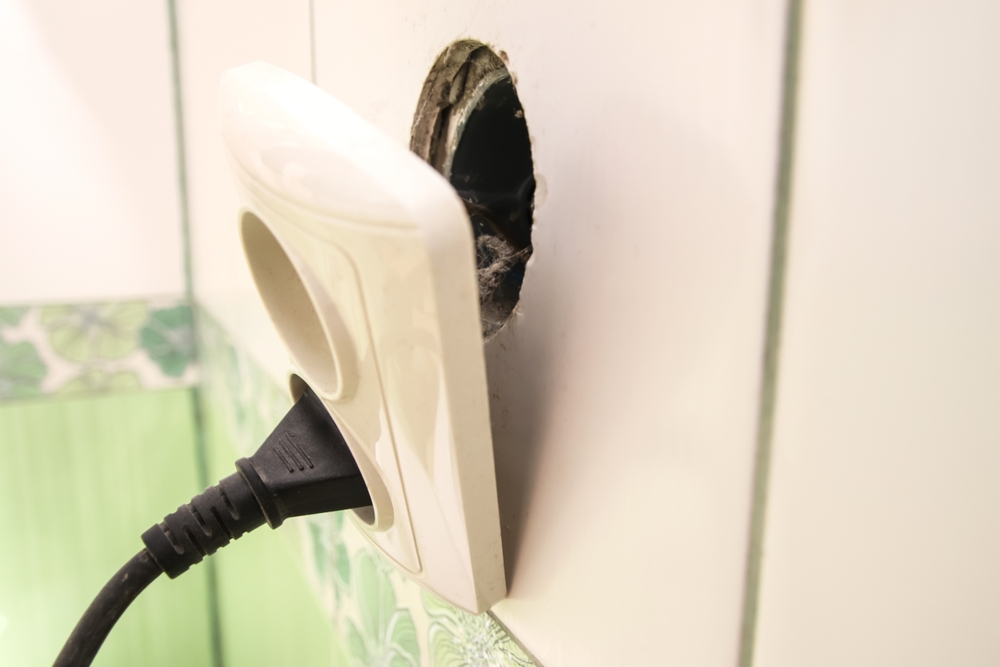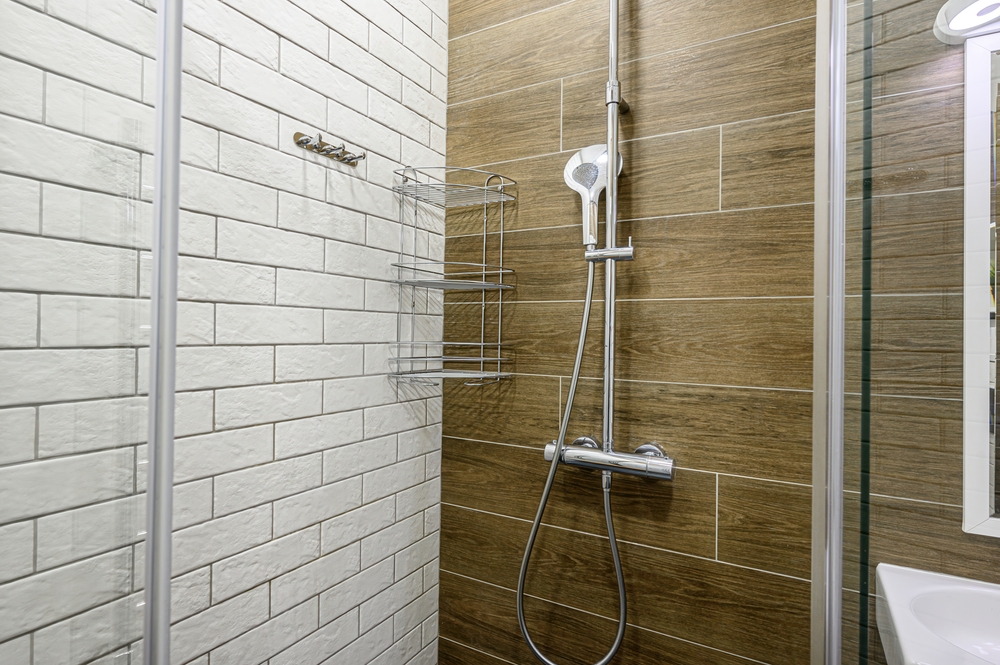How Much Does Bathroom Wiring Cost?

Typical costs to rewire or install bathroom wiring
You can expect to pay £800 to £1,500 for bathroom wiring, depending on your requirements. This includes labour, materials, and certification.
When renovating or updating a bathroom, it’s not just the tiling, fittings, and décor you need to think about, as the wiring is just as important. Safe and reliable bathroom electrics are essential for lighting, extractor fans, electric showers, heated towel rails, and shaver points.
In this guide, we’ll look at the typical costs, factors that affect pricing, and the regulations you need to know before starting work. We’ll also provide money-saving tips and answer common homeowner questions.
User submitted wiring prices
| Job type | Description | Price | Units | Region |
|---|---|---|---|---|
| Bathroom wiring | Supply fire rated LED lights, shaver points, lights and pull cord switches. Extractor fan I supplied. | £725 | Total price | South East |
| Bathroom wiring | Install 4 x downlights and 1 x inline fan test and certificate | £332 | Total price | North East |
| Bathroom wiring | Install and test extractor fan. Wire up shower pump. Install and wire shaver socket, rewire ceiling light, wire in transformer for additional lighting, add box and switch for towel rail. Adjust RCD controlled circuits in circuit box, test and certificate | £330 | Total price | East of England |
| Bathroom wiring | Supply and fit a new extractor fan with timer to replace faulty extractor fan and add isolator switch for unit. | £135 | Total price | London |
| Bathroom wiring | installed a new extractor fan in bathroom wall mounted, drilled 110mm hole through wall connected to lighting circuit with fan isolator installed rcbo to upstairs lights. | £280 | Total price | East of England |
| Bathroom wiring | Supplied and Installed a bathroom fan on the outside wall including drilling a 4″ hole and then connecting the fan to the light fitting and certification | £236 | Total price | North West |
| Bathroom wiring | Wiring in an electric shower. | £265 | Total price | Cymru Wales |
| Bathroom wiring | shower circuit plus rcd, switch and cable, not shower, certificate. | £465 | Total price | East of England |
| Bathroom wiring | Fit 2 extractor fans into 2 bathrooms + isolators + earth bonding. 6-7 hours. | £820 | Total price | South East |
| Bathroom wiring | Replacement lighting circuit, switches, mirror light, bonding | £564 | Total price | North East |
| Bathroom wiring | Install a bathroom fan with switch outside. Carried out in under 2 hours and tidied well afterwards | £215 | Total price | London |
| Bathroom wiring | Wiring for a shower installing new cables 10mm and pull switch and correct protection including a certificate, shower not included. | £350 | Total price | North West |
| Bathroom wiring | Wire new shower circuit in 10mm (25m) with RCD protection, shower isolator and fit new electric shower (not included) and supply and fit 4x fire rated downlights in bathroom. 9 hours labour. | £738 | Total price | South West |
Average bathroom wiring cost in the UK
The cost of wiring a bathroom depends on the size of the room, the number of fittings required, and whether it’s part of a full rewire or just a small upgrade.
- Basic bathroom wiring (lighting and extractor fan only): £300 to £600
- Standard bathroom wiring (lighting, fan, shaver socket, heated towel rail): £600 to £1,000
- Bathroom with electric shower installation: £900 to £1,800+
- Full bathroom rewire as part of a renovation: £1,200 to £2,500
What does bathroom wiring include?
Bathroom wiring is more complex than in other rooms because of the presence of water and steam. Electricians must follow strict safety regulations, and every component must be properly installed to prevent shocks or fire hazards. A typical bathroom wiring job may include:
- Ceiling and wall lighting: Recessed LED spotlights, vanity lights, or moisture-resistant wall lights.
- Extractor fan: Helps remove condensation and prevent mould growth.
- Shaver socket or toothbrush charger: Specially designed low-voltage outlets for safe bathroom use.
- Heated towel rail or underfloor heating: Comfort features that require electrical connections.
- Electric shower installation: A dedicated high-power circuit from the consumer unit.
- Switches and controls: Often located outside the bathroom or as pull-cord switches inside.
If you are renovating your bathroom completely, your electrician may also need to upgrade the consumer unit (fuse box) or run new circuits to meet current UK wiring standards.

Factors that influence bathroom wiring costs
Several key factors affect how much you’ll pay for bathroom wiring in the UK:
1. Size of the bathroom
Larger bathrooms require more lighting points, additional sockets, and potentially extra circuits, which increases both labour and materials.
2. Number and type of fittings
Adding features like LED spotlights, smart lighting, electric underfloor heating, or designer towel rails will increase the total cost compared to a basic setup with a single light and fan.
3. Electric shower installation
Electric showers require a high-capacity circuit connected directly to the consumer unit. This is one of the most expensive elements of bathroom wiring and can add £300 to £600 to the total.
4. Consumer unit and existing wiring
If your current consumer unit is outdated or your home wiring is in poor condition, upgrades may be needed before new circuits can be safely installed. This can increase costs by £400 to £800.
5. Accessibility
Properties with easy access to ceiling voids, floorboards, and walls will be quicker and cheaper to wire. Homes with solid walls, finished décor, or limited access take longer, which increases labour costs.
6. Regional differences
As with all electrical work, prices are higher in London and the Southeast compared to the North of England, Wales, or Scotland. Expect to pay 10 to 20% more if you live in these areas.
Bathroom wiring regulations UK
Electrical work in bathrooms is classed as “notifiable work” under Part P of the Building Regulations. This means it must be carried out by a qualified and registered electrician.
Bathrooms are divided into safety zones depending on their proximity to water sources. Each zone has strict rules about what types of fittings and outlets can be installed. For example:
- Zone 0 (inside the bath or shower): Only low-voltage, fully waterproof equipment is allowed.
- Zone 1 (above the bath or shower up to 2.25m): Requires IP-rated lighting and fans.
- Zone 2 (next to the bath or basin): Suitable for shaver sockets and some lights if rated correctly.
Because of these rules, hiring a professional is essential. DIY bathroom wiring is unsafe and could invalidate your home insurance.
Why hire a qualified electrician?
Hiring a Part P-registered electrician ensures your bathroom wiring is safe, compliant, and certified. A professional will:
- Install waterproof fittings suitable for bathroom use.
- Run dedicated circuits for high-power appliances like electric showers.
- Test and certify the installation with an Electrical Installation Certificate.
- Ensure your consumer unit has RCD protection (a legal requirement for bathroom circuits).
Not only does this protect your family, but it also ensures compliance if you ever sell your home.
How to save money on bathroom wiring
Bathroom wiring can be expensive, but there are ways to reduce costs without cutting corners:
- Plan ahead: Decide on the number of lights, sockets, and appliances before work starts to avoid costly changes later.
- Combine jobs: If you’re rewiring other parts of the house, include the bathroom in the same project to reduce overall labour costs.
- Choose standard fittings: Designer lights and towel rails look great but increase costs quickly. Opt for mid-range products for the best balance.
- Get multiple quotes: Prices vary, so always compare at least three local electricians.

Bathroom wiring FAQs
How long does bathroom wiring take?
Most bathroom wiring jobs take 1 to 3 days, depending on the size of the room and complexity of the installation.
Do I need an electrician to wire an extractor fan?
Yes, extractor fans in bathrooms must be connected by a qualified electrician due to the presence of moisture and safety regulations.
Can I have a standard plug socket in the bathroom?
No. Standard 13A sockets are not permitted in bathrooms, except at least 3m away from the bath or shower. Instead, special shaver sockets or toothbrush charging points are used.
Do I need certification for bathroom wiring?
Yes. Your electrician will provide an Electrical Installation Certificate confirming the work complies with UK wiring regulations.
Need an electrician?
Ready to rewire or upgrade your bathroom? The best way to get an accurate cost is to compare free, no-obligation quotes from qualified local electricians.